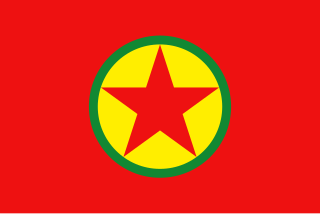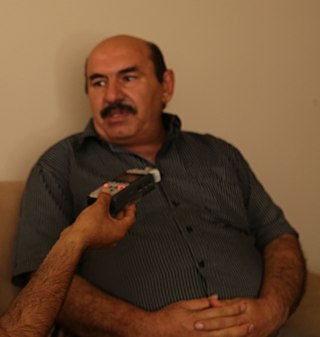
The Kurdistan Workers' Party or PKK is a Kurdish militant political organization and armed guerrilla movement which historically operated throughout Kurdistan but is now primarily based in the mountainous Kurdish-majority regions of southeastern Turkey and northern Iraq. It was founded in Ziyaret, Lice on 27 November 1978 and has been involved in asymmetric warfare in the Kurdish–Turkish conflict. Although the PKK initially sought an independent Kurdish state, in the 1990s its official platform changed to seeking autonomy and increased political and cultural rights for Kurds within Turkey.

Abdullah Öcalan, also known as Apo, is a founding member of the militant Kurdistan Workers' Party (PKK).
The history of the Kurdistan Workers' Party (PKK) began in 1974 as a Marxist–Leninist organization under the leadership of Abdullah Öcalan. In 1978 the organization adopted the name "Kurdistan Workers Party" and waged its low-level Urban War in Turkish Kurdistan between 1978 and 1980. The PKK restructured itself and moved the organization structure to Syria between 1980 and 1984, after the 1980 Turkish coup d'état. The Kurdish-Turkish conflict began in earnest in 1984. The rural-based insurgency lasted between 1984 and 1992. The PKK shifted its activities to include urban attacks against Turkish military bases between 1993–1995 and later 1996–1999. Öcalan was captured in Kenya in early 1999. After a "self declared peace initiative of 1999", hostilities resumed in February 2004. 2013 saw another ceasefire, but the conflict resumed again in 2015 and has continued since.

Nazımiye is a municipality (belde) and seat of the Nazımiye District of Tunceli Province in Turkey. It had a population of 1,262 in 2021. It is populated by Kurds of the Arel and Lolan tribes. The main religion is Kurdish Alevism and main language is Zaza.

Osman Öcalan was a Kurdish militant and ex-commander of the Kurdistan Workers' Party.
The Democracy Party was a pro-Kurdish political party in Turkey founded on the 7 May 1993.
Cemîl Bayik is one of the five founders of the Kurdistan Workers' Party (PKK), and is among the organization's top leadership. He is a member of the 12-man leadership council of the Kurdistan Communities Union, a Kurdish political umbrella organisation that the PKK is part of. He is also part of the three-man Executive Committee of the PKK, the leading body of the organisation, which consists of himself, acting PKK leader Murat Karayilan and Fehman Huseyin from Rojava, the PKK's commander.

Mazlum Doğan was a journalist and a founding member of the Kurdistan Workers' Party (PKK). He was a Kurdish Alevi which was often told to attract new recruits to PKK. He was the first chief editor of the propaganda newspaper Serxwebûn of PKK. In 1979, he had planned to leave Turkey towards Syria, but was arrested and served time in the infamous Diyarbakir No. 5 prison. Mazlum Doğan committed suicide in protest of the Turkish coup d'état and the inhumane conditions he and other prisoners were facing inside of the penitentiary. Today he is presented as a hero and a martyr by PKK and related organisations.
Mustafa Karasu also known as Huseyin Ali is a deputy chairman Turkish founder of the Kurdistan Workers' Party (PKK), a Kurdish rebel group fighting an armed insurgency against the government of Turkey for an independent Kurdistan. The group is recognised as a terrorist organisation by Turkey, the United States and EU.

Duran Kalkan, also known as Selahattin Abbas, or Selahattin Erdem is a senior commander of the Kurdistan Workers' Party (PKK).

The Democratic Union Party is a Kurdish left-wing political party established on 20 September 2003 in northern Syria. It is a founding member of the National Coordination Body for Democratic Change. It is the leading political party among Syrian Kurds. The PYD was established as a Syrian branch of the Kurdistan Workers Party (PKK) in 2003, and both organizations are still closely affiliated through the Kurdistan Communities Union (KCK).
Kemal Pir, also known as Laz Kemal was a Laz-Turkish Marxist–Leninist revolutionary and one of the ethnically Laz founders of the Kurdistan Workers' Party.
Haki Karer was a Turkish leftist activist and is a central figure in the memory of the PKK.
Besê Hozat is a leader in the Kurdistan Workers' Party and is the co-chair of the Kurdistan Communities Union alongside Cemil Bayik. She is the sixth member of the General Presidential Council, the highest authoritative body in the PKK.
The Kurdistan Workers' Party ceasefire of 1993 was a short lived ceasefire declared by Abdullah Öcalan at a press conference. He held together with Jalal Talabani ahead of Newroz on the 17 March 1993.
The Kurdish trial in Düsseldorf was a major trial and span from between October 1989 to March 1994. It took place in a for this trial renovated court house at the High Court in Düsseldorf. The court room had to be adapted to the requirements for the case which demanded an extensive amount of fifteen additional special compartments for the talks between lawyers and defendants. Additionally the trial demanded that court files like the declarations of witnesses, lawyers and judges were to be translated into the languages Turkish, Kurdish and German.

Yaşar Kaya was a Turkish-Kurdish politician and publisher of the pro-Kurdish newspaper Özgür Gündem. Together with authors like Ismail Besikçi and Musa Anter, he was a co-founders of the Kurdish Institute of Istanbul in 1992.

Murat Bozlak, was a Kurdish politician active in several political parties. He was the president of the People's Democracy Party (HADEP) and a member of the Grand National Assembly of Turkey for the Peoples’ Democratic Party (HDP). Bozlak was a Kurdish politician and a founding member of the Social Democracy Party (SODEP), the Social Democratic Populist Party (SHP), the People's Labor Party (HEP), the Democracy Party (DEP) and the HADEP. The first two parties were dissolved, while the latter three were banned by the Turkish constitutional court.

The Kurdistan Workers' Party insurgency is an armed conflict between the Republic of Turkey and the Kurdistan Workers' Party, as well as its allied insurgent groups, both Kurdish and non-Kurdish, who have either demanded separation from Turkey to create an independent Kurdistan, or attempted to secure autonomy, and/or greater political and cultural rights for Kurds inside the Republic of Turkey.
The Israel–PKK conflict refers to the clashes between Israel and the Kurdistan Workers' Party (PKK) during the 1980s, as well as the remarks they made about each other in the previous years and the years after the clashes. Throughout its existence, the PKK maintained its Anti-Zionist stance and an opposition to Israel, as part of Abdullah Öcalan's teachings.









